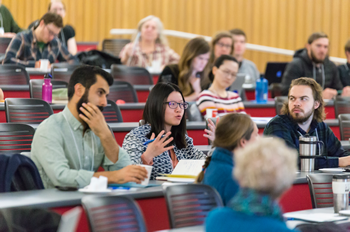We’re continuing to share reflections from the 2017 Community Engagement Fellows on the blog. In today’s post, Andy Leidolf introduces his four part series, “The Community Manager’s Survival Guide: Building Social Capital in Large, Heterogeneous, Geographically Dispersed Research Networks.” You can catch up on all posts by the Fellows here.
Posted by Andy Leidolf, Coordinator, Honors Program, Utah State University, and Executive Director, Society for Freshwater Science. Leidolf served as iUTAH Assistant Director and Project Administrator from 2014-2018.
It’s Monday morning, 9 am. I am fresh off a two-week trip that seemed like a great idea when it was conceived three months ago. Confronted with the stark reality of my overflowing e-mail inbox, endless to-do lists spread across no less than three project management software applications, and the surly looks with which I am greeted by my co-workers, that axiom clearly no longer holds. In exactly four weeks, iUTAH EPSCoR will hold its last Annual Symposium and Summer All-hands Meeting, to cap off a successful 5-year run of advancing water science, training, education and outreach for the citizens of the state of Utah. And I am way behind.
I need to recruit people to introduce five invited talks of participants sharing their personal journeys with our project. I need to confirm 39 oral presentations spread among seven concurrent sessions. I need seven session chairs and one panel moderator. I need to sweet-talk/coerce/beg contacts at ten state institutions of higher education into convincing their top-level administrators to record a short video message congratulating iUTAH on its successes. I need to breathe. I need help. Fast.

And so the e-mails start going out in 30-second increments. By 10:30 am, the worst of the carnage is over. All there is left to do now is wait. Well, and move on to my next series of to-dos, judging by the “I am not happy with you” look on the face of our staff assistant.
Fast forward to Friday: I now have five project participants rearing to give the introduction of their lives, and to work with their respective charges on developing their talks. Thirty-seven oral presentations are confirmed—with only two retractions. I have a panel moderator. My Dropbox holds video testimonials from a university president, two provosts, two associate vice presidents for research, and a college dean. More are on the way. Seven concurrent sessions now have chairs, all of whom are not just eager for their tasks, but actually scoffed at the idea of me assembling the speaker bios for them: “Just ask them to send the bios directly to us,” they said. “One less thing for you to do.” Mind you, these are busy people. Wow.
So how did all of this come together so quickly?
Did I just get lucky? Maybe.
Am I simply fortunate to be working with awesome, motivated people? Absolutely.
Am I that awesome? I’ll take the Fifth, thank you very much.
If engaging with people is a community manager’s core competency, our currency is social capital. Social capital builds and maintains a reservoir of trust and good will that managers can tap to obtain wide-spread buy-in for new programs and initiatives; ensure rapid member activation in response to critical, time-sensitive asks; or promote general compliance with community workflows, processes, norms, and policies.
When I first assumed my position as Assistant Director and Project Administrator of iUTAH, a statewide research network involving over 800 current and former participants, eleven institutions of higher education, and over 100 partner organizations, there was no training manual on how to build social capital within this large, heterogeneous group. I had to make my own, a “Community Manager’s Survival Guide,” if you will. In the coming days, I will share some of the lessons learned over the past three years in a series of three blog posts that examine in more detail the tools and approaches I have used—some with more success than others—to negotiate the obstacles of engaging with my diverse constituency of R1 researchers, primarily undergraduate-serving institution (PUI) faculty, postdocs, graduate and undergraduate students, and non-academic partners.
Next in the series: Emphasizing “Inreach” to Overcome Geographic Dispersion.